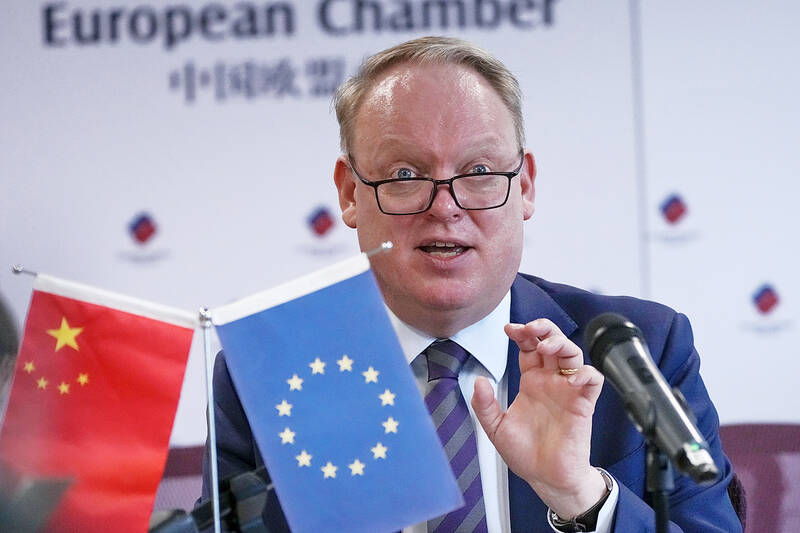European firms doubt China’s appetite to fix economy, EU lobby group says – Taipei Times

UNCONVINCING:
China is becoming less appealing to European investors, as they face less predictability and more legal uncertainties, the lobbying group said
European firms in China doubt the Chinese government has a credible plan to boost demand in the ailing economy or would carry out long-promised reforms, diminishing their appetite to invest in the country, a European business lobby group said on Wednesday.
The EU Chamber of Commerce in China said in the latest edition of its Position Paper that many of its more than 1,700 member companies are now reconciling themselves to the fact that the problems they face might have become permanent features rather than “growing pains” of an emerging market.
“A tipping point has been reached, with investors now scrutinizing their China operations more closely as the challenges of doing business are beginning to outweigh the returns,” chamber president Jens Eskelund said at an event where the paper was released.
Photo: AP
“It has become so much harder to make money in the Chinese market,” he added.
Last year, EU foreign direct investment (FDI) flows to China dropped by 29 percent from the previous year to 6.4 billion euros (US$7.07 billion), European Commission data showed.
Meanwhile, profit margins in China have sunk for about two-thirds of its members to equal to or below the global average, the chamber said.
“With many other markets offering greater predictability and legal certainty along with the same return on investment, continuing to invest at previous levels in the China market is simply becoming harder to justify,” the chamber’s report read.
European firms must wrestle with Chinese competitors receiving unfair subsidies, a highly politicized business environment, Chinese President Xi Jinping’s (習近平) heightened focus on national security, and perennial market access and regulatory barriers, the chamber said.
However, the “central concern” was China’s economic slowdown.
After a dismal second quarter, Chinese policymakers signaled they were ready to deviate from their playbook of pouring funds into infrastructure, instead targeting fresh stimulus at households.
However, promise fatigue has become prevalent among European firms, and doubts over China’s commitment to reform are increasing, the chamber said.
Economists are still waiting for specific plans to reinvigorate the 1.4 billion-strong consumer market. The top decisionmaking body of the ruling Chinese Communist Party in July pledged that it would announce such plans and it recently rolled-out subsidized trade-in scheme for consumer goods.
The chamber said the trade-in program is unlikely to significantly increase domestic consumption as the amount budgeted for it works out to just about 210 yuan (US$29.53) per capita.
“The government needs to look at what can be done for China to regain its position as a top location for European FDI,” Eskelund said.
Comments will be moderated. Keep comments relevant to the article. Remarks containing abusive and obscene language, personal attacks of any kind or promotion will be removed and the user banned. Final decision will be at the discretion of the Taipei Times.
Related
European markets fall and euro soars amid Trump tariff delays
European stock markets have slumped after Donald Trump’s second reversal on tariffs caused deep uncertainty among investors, while the euro was on track for i
European Central Bank cuts interest rates, keeps door ajar to…
Open this photo in gallery:The European Central Bank headquarters, in Frankfurt, Germany, on June 6, 2024.Wolfgang Rattay/ReutersThe European Central Bank cut i
European security, economy without Türkiye ‘impossible,’ says business leader –…
ISTANBUL Türkiye’s strategic importance for Europe's future is both undeniable and multifaceted, encompassing critical areas suc
Westcon-Comstor promotes Rene Klein to lead unified European business
Westcon-Comstor has announced the appointment of Rene Klein as executive vice president for EMEA, tasked with leading the company’s new unified leadership st











